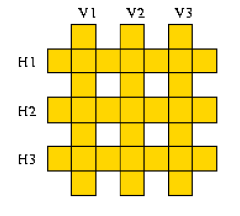The creole of Paradise Island has 14 words: "abandon", "abalone", "anagram", "boat", "boatman", "child", "connect", "elegant", "enhance", "island", "man", "sand", "sun", and "woman".
The Paradise Times have published this crossword:
The crossword contains some of the 14 words but no other words.
Write a Prolog program that starts from
word(X) :-
member(X,
[
[a,b,a,n,d,o,n], [a,b,a,l,o,n,e], [a,n,a,g,r,a,m],
[b,o,a,t], [b,o,a,t,m,a,n], [c,h,i,l,d],
[c,o,n,n,e,c,t], [e,l,e,g,a,n,t], [e,n,h,a,n,c,e],
[i,s,l,a,n,d], [m, a, n], [s,a,n,d],
[s,u,n], [w, o, m, a, n]
]).
solution(H1,H2,H3,V1,V2,V3) :-
and defines the predicate solution in such a way that
solution(H1,H2,H3,V1,V2,V3)
is true if and only if H1, H2, H3, V1, V2, and V3 are valid words of Paradise
Island which form a valid crossword when written into the grid given above.
(For example, the second letter of H1 should coincide with the second letter
of V1.)
Use the query
?- solution(H1,H2,H3,V1,V2,V3).
to solve the crossword. Find all solutions to the crossword.
Hint: You might want to start from a smaller crossword and a less rich lexicon.

